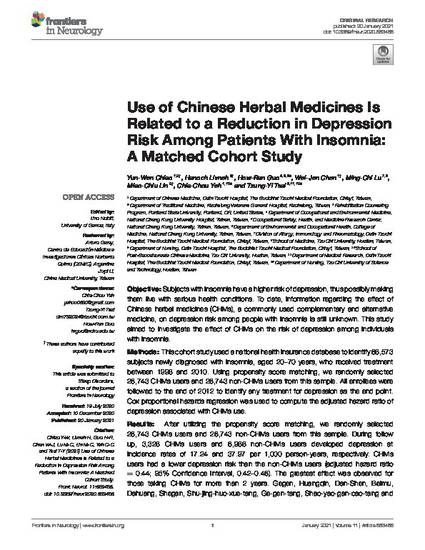
- Insomnia -- Treatment,
- Chinese medicine -- Longitudinal studies,
- Mental depression -- Treatment,
- Alternative medicine
Objective: Subjects with insomnia have a higher risk of depression, thus possibly making them live with serious health conditions. To date, information regarding the effect of Chinese herbal medicines (CHMs), a commonly used complementary and alternative medicine, on depression risk among people with insomnia is still unknown. This study aimed to investigate the effect of CHMs on the risk of depression among individuals with insomnia.
Methods: This cohort study used a national health insurance database to identify 68,573 subjects newly diagnosed with insomnia, aged 20–70 years, who received treatment between 1998 and 2010. Using propensity score matching, we randomly selected 26,743 CHMs users and 26,743 non-CHMs users from this sample. All enrollees were followed to the end of 2012 to identify any treatment for depression as the end point. Cox proportional hazards regression was used to compute the adjusted hazard ratio of depression associated with CHMs use.
Results: After utilizing the propensity score matching, we randomly selected 26,743 CHMs users and 26,743 non-CHMs users from this sample. During follow up, 3,328 CHMs users and 6,988 non-CHMs users developed depression at incidence rates of 17.24 and 37.97 per 1,000 person-years, respectively. CHMs users had a lower depression risk than the non-CHMs users (adjusted hazard ratio = 0.44; 95% Confidence Interval, 0.42–0.46). The greatest effect was observed for those taking CHMs for more than 2 years. Gegen, Huangqin, Dan-Shen, Beimu, Dahuang, Shegan, Shu-jing-huo-xue-tang, Ge-gen-tang, Shao-yao-gan-cao-tang and Píng wèi saˇ n were significantly associated with a lower risk of depression.
Conclusions: Findings from this study demonstrated that adding CHMs to conventional treatment significantly reduces depression risk among patients with insomnia.
© 2021 Chiao, Livneh, Guo, Chen, Lu, Lin, Yeh and Tsai.
This work is licensed under a Creative Commons Attribution 4.0 International License.
